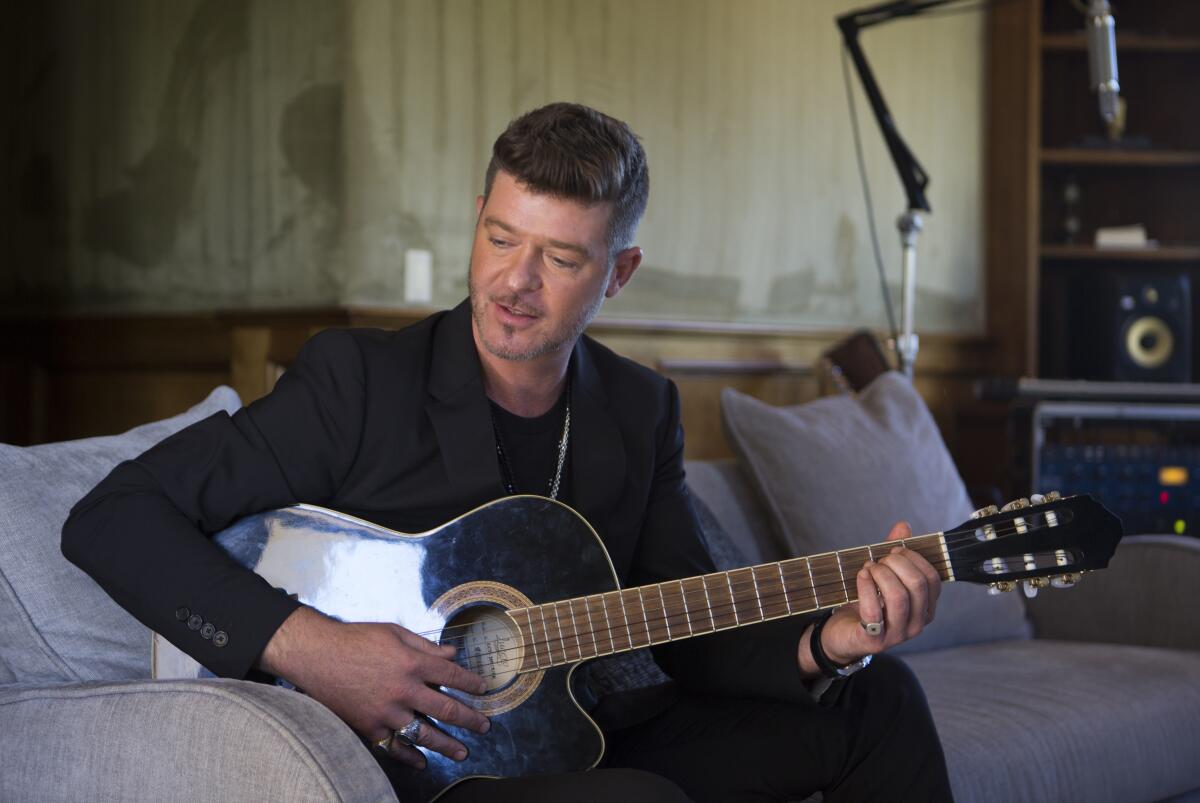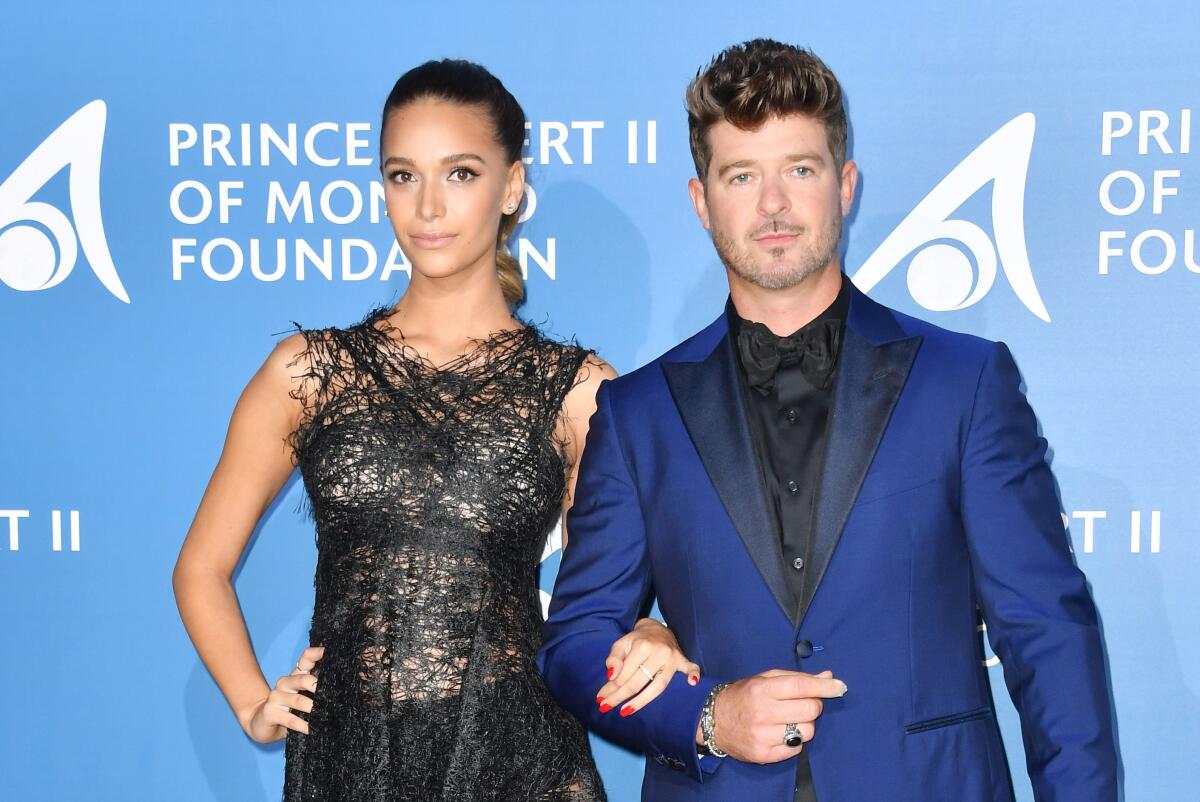Every singer wants a hit. Robin Thicke’s nearly destroyed him

- Share via
The goofy concept. The bizarre costumes. The very short list of singers who’ve returned successfully to music from reality television. Even with his career at a historic low point, Robin Thicke knew that signing onto “The Masked Singer” was a risk.
“Look, if I’d still been No. 1 on the radio, who knows if I would’ve taken it,” he said recently.
But there was something about Fox’s singing competition — a truly strange South Korean import in which a panel of friendly judges rates performances by unnamed celebrities wearing elaborate, borderline-psychedelic disguises — that attracted Thicke when producers pitched him on the show last year.
“They told me, ‘We’re not here to hurt people’s feelings,’ ” he recalled. “And I said, ‘That’s great for me, ’cause I don’t wanna tell people what they’re doing wrong.’ ”
Experience had taught him how unpleasant that could be.

In 2013, after a decade of steady work as a medium-wattage R&B act, Thicke suddenly went supernova with “Blurred Lines,” a raunchy funk smash that sold 10 million copies and spent 12 weeks atop Billboard’s Hot 100. Then, just as he was getting used to stardom, public opinion turned.
Critics decided that “Blurred Lines” — in which the singer tells a woman, “I know you want it” — embodied what’s described these days as toxic masculinity; one writer said the song was “kind of rapey.” And few were shocked when a sleazy photo surfaced showing the then-married Thicke cradling a female fan’s behind. Thicke’s wife at the time, the actress Paula Patton, left him soon afterward, which inspired the singer to make a miserably received breakup album called “Paula.” (“Don’t leave me out here in the cold,” he begs in one track. “At least open the doggy door.”)
Asked if he was relieved that all this went down before the full flowering of so-called cancel culture, Thicke — who grew up privileged in Los Angeles as a son of the TV stars Alan Thicke and Gloria Loring — raised an eyebrow.
“Yeah, but let’s be clear: It was a pretty thorough lashing,” he said. “No holds barred.”
Now, after lying low for a while, he’s looking for a comeback. Buoyed by surprisingly strong ratings for “The Masked Singer,” Thicke, 42, is working on a new album, his first since the ill-advised “Paula.” Advance singles including “When You Love Somebody” and “That’s What Love Can Do” — heed those gently romantic titles — have fared well on urban AC stations such as L.A.’s KJLH-FM (102.3).
And Friday night, Thicke will play the Microsoft Theater, part of his gig as an opener on tour with Fantasia, not long before the season finale of “The Masked Singer” is scheduled to air Dec. 18. It’s all a few rungs below where he used to be, before “Blurred Lines” — which also spawned a high-profile legal case — went from a dream to a nightmare. But it also feels like a crucial realignment of Thicke’s ambition and his natural talents.
“I’ve seen a real change in Robin — in his warmth,” said the series’ showrunner, Izzie Pick Ibarra, who said Thicke was coming off a “rough patch” when she cast him as a panelist alongside Jenny McCarthy, Nicole Scherzinger and Ken Jeong. “He’s regained so much confidence in his self-worth and in his expertise.”
The singer agrees. “The show was an opportunity for me to put on a suit and be the best Robin Thicke I could be,” he said the other morning as he sipped coffee on a patio at his home in Malibu. “And the positive energy that’s come from it is exactly what I needed.”
Actually, the house — a hillside Italianate number with sweeping ocean views and a small recording studio — wasn’t Thicke’s real home, which was another reason he’d been searching for a boost. In November 2018, Thicke’s place in Malibu burned down in the Woolsey fire; this rental was where the singer and his family — his fiancée, April Love Geary; their two young daughters; and Thicke’s 9-year-old son with Patton — were staying while they rebuilt.
Thicke’s typically cheerful expression sagged as he went over some of the things he’d lost, including the piano he’d used to write his first hit, the tender “Lost Without U,” and the many “knick-knacks” he’d collected over the years on his world travels for his son.
“I told him, ‘Pack up as much as you can,’ ” Thicke said, remembering the moments after they received the mandatory evacuation order. “I came in his room and he’s got, like, a pair of underwear and a book.” He laughed. “But it’s just stuff. We got out of there.”
Yet the fire was just the last in a succession of serious hardships — hardships, unlike his divorce or “Paula’s” brutal reviews, that Thicke could hardly be said to have brought upon himself. In 2016, his father died unexpectedly at age 69 while playing hockey in Burbank with Robin’s younger half-brother; a year later, Thicke’s manager and longtime friend Jordan Feldstein died of a heart attack at 40.

And then there was the widely questioned lawsuit over “Blurred Lines” in which Marvin Gaye’s estate accused Thicke and Pharrell Williams, who co-wrote and produced the song, of ripping off Gaye’s mid-’70s classic “Got to Give It Up.” A jury awarded Gaye’s heirs more than $7 million, leading countless music-industry figures to warn that the verdict — the result of an apparent inability to distinguish between homage and plagiarism — would stifle creativity.
Reflecting on his remarkably rocky stretch from 2013 to 2018, Thicke sighed and summed it up as “a little bit of bad luck, a little bit of consequences.” His dad’s death was especially tough, he said, not least because Alan Thicke was the family member everybody else typically leaned on during a crisis. “He was the king of making people feel good,” Robin said of the man known to millions of Americans as the comfortingly paternal Dr. Jason Seaver on “Growing Pains.” He idly fingered a chain looped around his neck, then added quietly, “I thought we had 15, 20 more years.”
Thicke takes up some of this in his new music. “Testify,” another recent single, is disarmingly plainspoken as the singer ponders a change in fortune: “Couldn’t keep it together, my family / And all my reckless ways caught up with me.” The soft sound is different from “Blurred Lines” too — more like his early stuff, with its echoes of such soul OGs as Donny Hathaway and Teddy Pendergrass.
“I was only pop for a year,” he said, setting his coffee cup down next to an overflowing ashtray. “Up until then, black radio was where I lived.”

It took time to remember that was his sweet spot, Thicke said. After “Paula” tanked — “It was a jumbled album because I was a jumbled person,” he says in retrospect — he tried to reboot by working with heavyweight Top 40 producers including Max Martin, who teamed Thicke with Nicki Minaj for 2015’s “Back Together,” a thumping electro-disco banger that went nowhere.
“I think it’s a great record, and if somebody else sang it, it would’ve been a hit,” Thicke said. “I’m sure Max feels the same way, because Max doesn’t miss.” He laughed. “If he missed with me, it definitely wasn’t his fault.”
Does Thicke get any enjoyment today from singing “Blurred Lines” in concert? “Oh yeah,” he said. “And you know why? Because when I perform it, as soon as I go, ‘Everybody get up,’ the whole room’s spirit lifts.” Still, he claims to have come to an understanding of the song’s problematic qualities.
Williams, in an October interview with GQ, said he’d realized that, even though he and Thicke meant no harm with the song’s lyrics, “there are men who use the same language when taking advantage of a woman, and it doesn’t matter that that’s not my behavior.”
Thicke said he’d heard his friend’s comments and then offered his own, more equivocal take. “However it makes people feel, that’s their right to feel that way,” he said. “We have to be respectful and honor anybody who feels something negative when they hear that song.”
But negativity isn’t what Robin Thicke is selling right now. It’s like on “The Masked Singer,” he explained: When a contestant performs poorly, his strategy is to focus on the contestant’s strengths.
“If they’re not a great singer, I’ll say, ‘I loved that you picked that song,’ ” he said, his bright eyes beaming well-practiced sincerity. “Or, ‘I might not like your jacket, but I love your pretty hair.’”
More to Read
The biggest entertainment stories
Get our big stories about Hollywood, film, television, music, arts, culture and more right in your inbox as soon as they publish.
You may occasionally receive promotional content from the Los Angeles Times.








